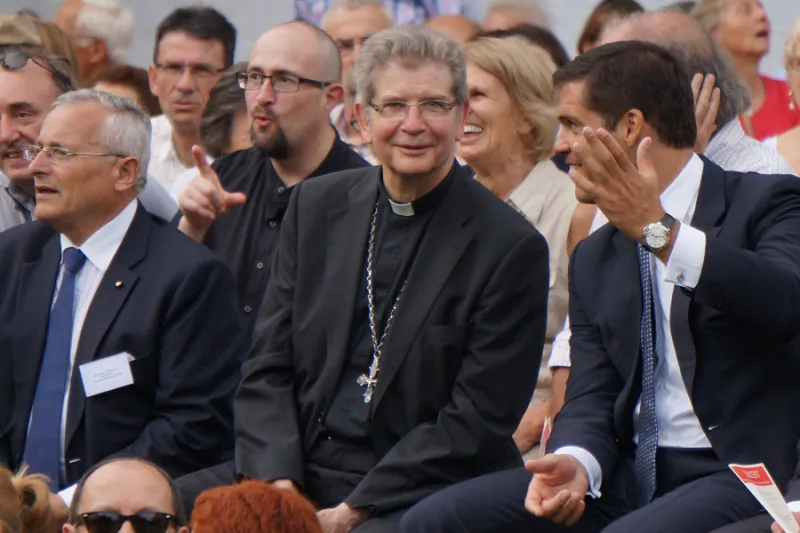
Paris, France, Apr 26, 2022 / 07:15 am (CNA).
The appointment of Archbishop Laurent Ulrich as the new archbishop of Paris was announced two days after Emmanuel Macron was elected for another five years as the president of France.
The 70-year-old Ulrich is also likely to serve in his new assignment for five years before reaching the normal retirement age for bishops in 2026.
Ulrich, until now the archbishop of Lille, northern France, fills the place left by Archbishop Michel Aupetit, who resigned last December after a controversy surrounding an alleged relationship with a woman before he was archbishop of Paris.
Since Aupetit’s departure, the former Marseille Archbishop Georges Pontier has served as apostolic administrator of the archdiocese. Ulrich will be installed on May 23 at the Church of Saint-Sulpice.
The new archbishop of Paris was born in Dijon, northeastern France, on Sept. 7, 1951. He studied at the Jesuit high school Saint-Joseph de Reims, then obtained a master’s degree in philosophy and theology in Dijon and Lyon.
He was ordained to the priesthood in Dijon Cathedral on Dec. 2, 1979, at the age of 28. After some years serving in a parish and as a high school chaplain, he took on further responsibilities in the Dijon archdiocese. In 1985, he became episcopal vicar and in 1990, vicar general. Ten years later, he was appointed archbishop of Chambéry in southeastern France.
In 2008, he was named archbishop of Lille, a city an hour away from Paris by high-speed train. Lille is an important archdiocese with a big Catholic university and an established tradition of social Catholicism thanks to the area’s role in the Industrial Revolution.
In total, Ulrich has been an archbishop for 22 years, which is an advantage in leading a sizable archdiocese like Paris. His predecessor Archbishop Aupetit had never served as an archbishop before he was appointed to Paris in 2017, just three years after he was named a bishop in Nanterre, in the suburbs of Paris. One of the factors in Aupetit’s resignation was his difficulty in governing the archdiocese.
Ulrich has a reputation for being able to navigate the political world. This is also very important for Paris, where the archbishop spends time meeting political authorities. He gained experience in this area not only in Lille but also as a vice-president of the French bishops’ conference from 2007 to 2013. (He was also president of the bishops’ council for finance between 2001 and 2007 and is currently president of the bishops’ council for Catholic teaching, which concerns schools and universities.)
As archbishop of Paris, Ulrich will regularly meet with government officials, in particular concerning the restoration of Notre-Dame de Paris after the devastating fire. For the past five years, relations between Catholics and the Macron government have been difficult, with tensions over restrictions on worship during the coronavirus crisis, new bioethics laws, and the extension of abortion up to 14 weeks just before the presidential election.
Ulrich will have to try to improve this relationship while at the same time promoting the Catholic position on several disputed topics. These will include euthanasia, which Macron seems ready to push forward in the next five years. This battle might prove challenging for Ulrich as he belongs to a generation of bishops who are reluctant to address political issues except when they believe it is absolutely necessary.
Ulrich, who could be elevated to the rank of cardinal, is not a conservative, but he is also not known for expressing very progressive positions on Church teaching. He is considered a calm figure who takes time to listen and adopts a pragmatic approach.
For example, his application of the motu proprio Traditionis custodes, restricting celebrations of the Traditional Latin Mass, does not seem to have aroused particular controversy in Lille. This might be good news for traditionalist Catholics in Paris, where celebrations were curbed in certain parishes under Aupetit.
Ulrich comes to Paris in the wake of Aupetit’s resignation, which took place suddenly and amid bad conditions. His job will be first to listen, reassure, and pacify the different sectors of the Church in Paris that had difficulties with Aupetit. He must also continue to work with the people who appreciated Aupetit.
Ulrich will probably also make some important decisions that could, at least partially, begin to lead the Paris archdiocese in a different direction from that established by Cardinal Jean-Marie Lustiger in the 1980s and 90s and taken further by Cardinal André Vingt-Trois from 2005 to 2017.
On Tuesday, minutes after he was appointed, Ulrich released a message to the Catholics of Paris.
“I am addressing you as friends,” he said, “because the call I received from the Church to come to Paris to exercise my ministry comes from Christ himself, who always presents himself as the friend of all, at all times and in all places. I come to you with ‘the joy of believing,’ which has been my motto for a long time.”
If you value the news and views Catholic World Report provides, please consider donating to support our efforts. Your contribution will help us continue to make CWR available to all readers worldwide for free, without a subscription. Thank you for your generosity!
Click here for more information on donating to CWR. Click here to sign up for our newsletter.




Leave a Reply